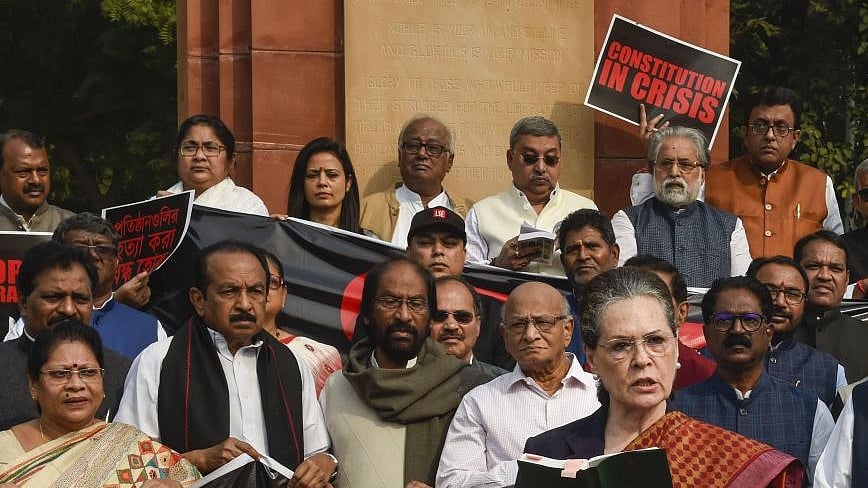
Don't let 'whims' of Governor, President hamper Constitution: Opposition-ruled states tell Supreme Court
Credit: PTI photo
New Delhi: Opposition ruled States of Karnataka, West Bengal and Himachal Pradesh on Wednesday contended before the Supreme Court that the Centre wanted to abrogate the main basis of Constitution, by raising questions over the April 8, 2025 judgment fixing timelines for clearing Bills passed by state legislatures.
They also asked a five-judge Constitution bench led by Chief Justice of India B R Gavai not to fall "into the trap" of letting the Governor become an impediment in the functioning of the Constitution or let him act on whims and fancies.
They submitted that States cannot be treated as municipalities.
For Karnataka, senior advocate Gopal Subramanium said that the submissions of Union government were meant indirectly to abrogate the fulcrum of Constitution, i e, cabinet-form of government and the responsibility to the legislature.
He said the Centre’s contention that the President and Governor have discretion is fundamentally flawed and the Cabinet is collectively responsible to the legislature in a Cabinet form of government, and emphasised that the Governor is outside the Cabinet.
He maintained that the democratic form of government through cabinet has been held to be part of the basic structure of Constitution.
Senior advocate Kapil Sibal, for West Bengal said that if a timeline is given for the Governors and the President, in connection with the Bills passed by the state assemblies, it would not require amending the Constitution; rather, it would ensure that Article 200 functions
He said the court should not fall into a trap where Governor becomes an impediment to the functioning of the Constitution.
The arguments were advanced before the bench also comprising Justices Surya Kant, Vikram Nath, PS Narasimha, and AS Chandurkar.
The matter related to the Presidential reference, which raised constitutional questions on whether the court can impose timelines for governors and the president to deal with bills passed by state assemblies.
Sibal said the sovereignty of the state legislature is as important as the sovereignty of Parliament, and the Governor should not be allowed to delay the bills passed by the legislature.
“You cannot create a discord, otherwise it will break down. The Constitution has to be interpreted in such a way that it is workable,” he said.
The counsel asserted the keyword here in Article 200 is as soon as possible, as there is an element of immediacy.
On Tuesday, the court had observed that the Constitution would have to be amended to incorporate all these timelines with the provisions of Articles 200 and 201 of the Constitution.
Sibal contended there are judicially manageable standards which are integrated to Article 200, that is, immediacy, forthwith, as soon as possible, without delay.
"If you give a timeline, you are amending the Constitution, the answer is no," he said, emphasising, this is to ensure that Article 200 functions.
He also said when a Bill is passed by the legislature, there is a presumption of constitutionality, which has to be tested in the court.
The bench, however, observed that the Governor will have to apply his mind to see whether the bill is repugnant or not, and he can’t simply be a postman or a super legislative body.
Sibal also contended that the will of the people in the form of a bill cannot be subjected to "whims and fancies" of Governors and the President, as the executive is barred from interfering with the legislative process.
Advocate Anand Sharma, representing the Himachal Pradesh government, submitted that the legislature is supreme and neither the President nor the Governor has any role in law-making.
He said that Governors are not viceroys or Governors-General, and they are bound by the aid and advice of the Council of Ministers, and the office of the Governor cannot be used to nullify the will of the people. The hearing in the matter will continue on Thursday.
